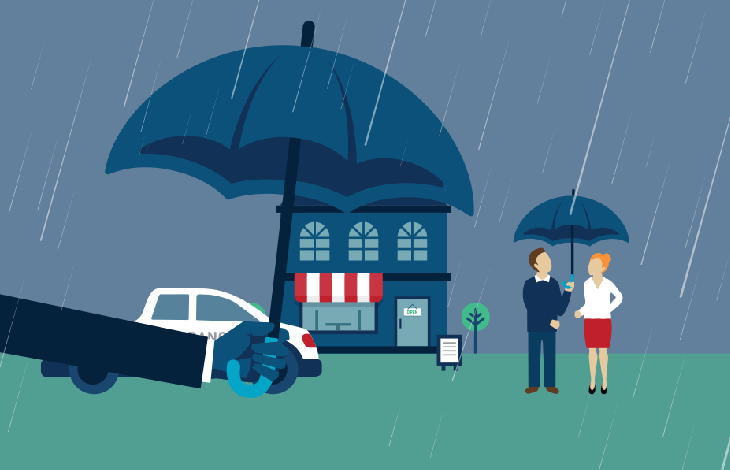Property Insurance
What is Property Insurance?
Property Insurance covers the loss or damage to physical property after an insured event or peril, such as storm damage, fire, or impact from a truck. It’s often sold as part of a package – for example, together with Farm, Home, or Business Insurance.
This type of insurance provides property owners with financial security and peace of mind – knowing that if the worst happens, like a fire or tree falling on your home, your financial loss will be minimised.
What does Property Insurance cover?
Most properties can be insured – as long as you fully disclose your occupancy situation and the purpose of the property. Property Insurance covers personal property (such as your home), the household contents, and valuables like jewellery or sports equipment.
This can be a:
- residential property
- farm
- unit
- strata building
- commercial strata
- retail store
- factory
- warehouse
- manufacturing facility.
Loss or damage insured
All property policies cover specified perils, such as:
- fire
- theft
- storm
- rain
- wind-related events
- impacts by vehicles and trees
- vandalism
You can also add a cover at an additional cost for other accidents, like shelves falling or stock being damaged by a pipe leaking.
As with any type of insurance cover, Property Insurance policies have limits and exclusions. The limits may relate to the total amount payable in the event of a claim, the location where the property is insured, or how your claim will be paid out. Typical exclusions include damage by insects, pre-existing damage, intentional damage, lack of maintenance, and flood.
Choosing your insurance policy
Choosing the right Property Insurance can be challenging as there are a few different packages:
- Home Insurance – includes cover for the house, contents and personal items taken outside the home.
- Farm Insurance – covers farm property. This can include the homestead, contents and personal items, also stables, barns, out-buildings, fencing, plant & equipment and grain in silos or livestock.
- Business Insurance – covers buildings, stock, contents, plant & equipment, and work in progress.
It’s essential to read and understand your insurance cover. Talk to your insurance adviser if you have any questions or don’t understand your insurance arrangements. We can provide you with advice on the best cover to suit your financial situation, needs and objectives.
Frequently Asked Questions
What insurance is best for a property?
Choosing the right property insurance can be challenging, as there are lots of different types, including Personal Property, Home, Farm, Business, and Stock. The cover also varies between insurers – some will only offer specified perils, while others will also cover accidental loss or damage. Other factors to consider include the use of the property, whether it will be renovated, value, and key risks in your area.
Why do I need property insurance?
Property Insurance is an easy way to manage your financial risk. When you buy insurance, you have protection against unexpected events damaging your property, such as fire, storm, or burglary. In exchange for an annual insurance premium, the insurance company promises to pay you in the event of loss or damage occurring. If you have no insurance, then you’ll have to pay for any loss, damage, or repairs from your own pocket. This is difficult to budget for, and may be outside your ability to pay.
What's the difference between homeowners insurance and other types of property insurance?
All Property Insurance covers buildings, contents, and specified types of property. The use of the property usually tells you what type of property package you need:
- Home Package – covers a number of sections, like public liability, glass and property (such as the home), contents, and personal valuables like jewellery.
- Farm Package – covers public liability and motor vehicles, with the property section covering the homestead, farm buildings, fencing and farm machinery.
- Commercial Package – usually covers theft, machinery breakdown, legal liability and property. Property for a business includes stock in process, finished stock, buildings, plant and equipment, and office contents.
What isn'tcovered by property insurance?
Property Insurance cover differs from one insurer to another, so it’s best to review your policy and make sure it covers most of your risk exposures. In many cases, Property Insurance has limits on the amount per accident or per item. Certain types of damage may also be excluded – for example, flood damage in certain areas, leaving the home unoccupied for a long time, or bushfire damage in fire-prone areas.
It’s worth taking time to read and understand what your insurance policy does and doesn’t cover. Your insurance adviser will make the whole process easier to understand.
What are the basic types of cover needed?
Property insurance covers a wide range of events. The seven key ones are:
- Fire
- Storm
- Impact By Falling Trees Or Vehicles
- Wind
- Vandalism
- Explosion
- Burglary
Other types of cover can be added – so speak to your insurance adviser to ensure you have the right cover in place.


